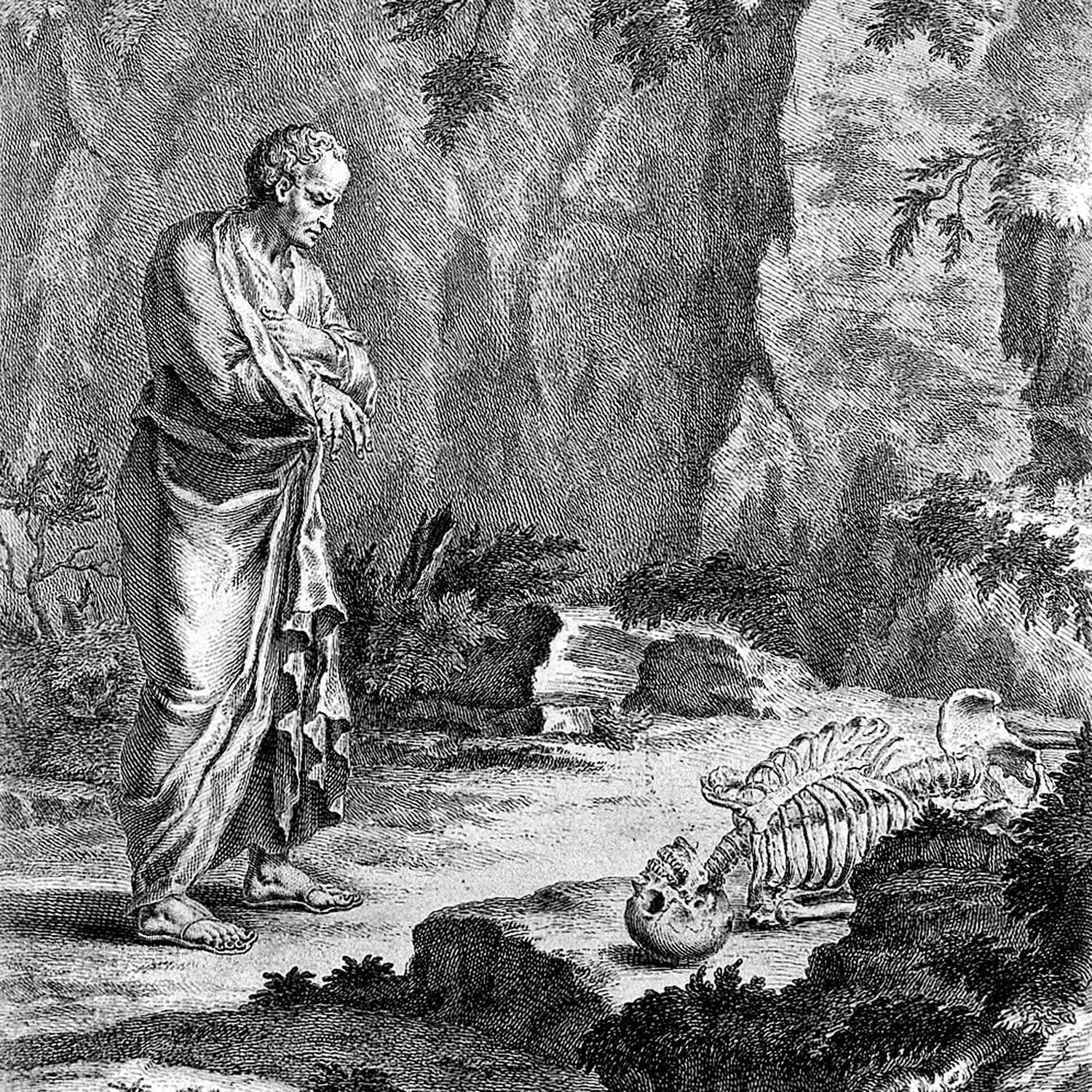resile

‘The Putrefaction of the Flesh of the Dying Emperor Galerius’, about 1413–1415 (Ms. 63, fol. 258)
It is a short step from reading about how the early Greek philosophers tried to make sense of the world (and how scholars throughout the ages have tried to make sense of early Greek philosophers) to reading medical texts from antiquity. 1 It also doesn’t hurt that I managed to acquire a few of the newer Loeb editions of Hippocrates and Galen, for reasons that remain opaque, as many bookstore choices tend to be.
Reading Hippocrates provides a similar effect to reading the oldest back issues of the Medico-Chirurgical Transactions 2 – very particular, very personal, and, as such, idiosyncratic. 3 Galen is a bit different. In his hunt to compose a well-tempered cavalier, he is more argumentative (nay, polemical) and apparently more interested in being correct than in being curious: he is not merely observing – he is judging. He makes his offerings not so much at the shrine of Asclepius, but to that minor deity who now hides behind the vague yet numinous appellation of Reviewer Number Two.
I read a few pages in the morning in a mental murkiness that softens the transition from sleep to wakefulness, sometimes skimming the surface of the Greek, more usually running an inattentive eye over the facing translation. One morning, the following passage provided an unusual jolt:

Πρὸς δὴ τοὺς τοιούτους λόγους ἀπομαχόμενοί τινες τῶν ἀπ’ Ἀθηναίου τοῦ Ἀτταλέως ὁμόσε χωροῦσιν οὔτε κατάστασιν ὑγρὰν καὶ θερμὴν μέμφεσθαι λέγοντες οὔθ’ εὑρεθῆναί τι νόσημα φάσκοντες ὑγρὸν καὶ θερμόν, ἀλλὰ πάντως ἢ θερμὸν καὶ ξηρὸν ὑπάρχειν ὡς τὸν πυρετόν, ἢ ψυχρὸν καὶ ὑγρὸν ὡς τὸν ὕδερον, ἢ ψυχρὸν καὶ ξηρὸν ὡς τὴν μελαγχολίαν.
In regard to such arguments, certain contentious followers of Athenaeus the Attaleian resile on the issue, saying that neither a wet and hot state is deserving of blame, nor is any disease discovered that is wet and hot, but in every case there is either hotness and dryness as in fever, or coldness and wetness as in dropsy, or coldness and dryness as in melancholia.
Resile? It was not the bafflement of ungracious journalists (noted by Safire) that I felt, but the twinge of a false step that had me limping, once I was more awake, to the OED for more information. That authority notes that ‘resile’ can be derived from the Latin resilīre, to spring back from or recoil (post-classically, to repudiate) via the French resiler / résilier (via Scotland, which is a detail unexpected enough to bear mentioning). This may perhaps be a fair translation for Galen’s original χωρέω, which as you will note, can mean to spring back or to give ground, although not usually when paired with the adverb ὁμόσε (together, in the same place).
Now instinct is perhaps no very sound arbiter for matters of formal lexicography (if such there be), but I will note that my instincts suggest that ‘resile’ is perhaps most common in legal or diplomatic contexts (or those contexts hoping to bear the imprimatur of legal or diplomatic authority – say, a foreign minister chatting with a journalist over an expensed meal) to signal de-escalation or withdrawal from an agreement, although I lack the sustained attention (or desire) to explore the point in depth. 4 Certainly χωρέω can be used in a diplomatic sense, as one finds in Dionysius of Halicarnassus (Antiquitates Romanae, 1.20.1):
ἐλθοῦσι δὴ τοῖς Ἀβοριγῖσι σὺν πολλῇ στρατιᾷ ἱκετηρίας οἱ Πελασγοὶ προτείνοντες ὁμόσε χωροῦσιν…
When the Pelasgi saw the Aborigines advancing with a numerous army, they met them unarmed with olive branches in their hands… (trans. E. Spelman)
The presence of a ‘numerous army’ (πολλῇ στρατιᾷ) suggests, however, that whatever diplomacy was in hand was perhaps rather fraught. 5 In the case of the Pelasgi, however, it is worth noting they are not drawing back from their position, but rather standing their ground to make their case – that is, they are not drawing back or resiling from the encounter.
That is all very fine, but what does it have to do with putting Galen into English? The original context of the quotation that started all this nonsense is a rather heated discussion of the κρᾶσις (temperament, mixture) of elements (hot, cold, wet, and dry) and the positive (εὐκρασία, health, wellness, balance) and negative (δυσκρασία, dyscrasia, distemper, imbalance) aspects of such mixtures. 6 Galen reviews the literature, as it were, and finds it wanting: in defining how to get away from states of dyscrasia, they fail to define eukratic states adequately. According to Galen, eukrasia involves a balance of all elements, in which no element prevails over or is in excess of another, according to the character of the patient (or creature). Immediately before the passage quoted above, Galen complains that some people (it is not quite clear who, although they apparently both wrong and wrong-headed) would define health as being a state in which the wet and hot elements prevail, which Galen asserts cannot be the case, because if those two elements are dominant, then the overall mixture cannot be balanced.
This leads to our quotation and the followers of Athenaeus of Attalia; they say ‘neither a wet and hot state is deserving of blame, nor is any disease discovered that is wet and hot’ (trans. Johnston). Logically, this does not seem to be a drawing back from the position that Galen is attacking (according to my rather haphazard summary), but rather a reaffirmation of it. The translation in the edition by P.N. Singer and P.J. van der Eijk thus seems somewhat more satisfactory:
In defence against such arguments certain of the followers of Athenaeus of Attalia counter 7 by saying that they do not find fault with any wet and hot state, and stating that no disease has been found which is wet and hot, disease being without exception either hot and dry, like fever, or cold and wet, like dropsy, or cold and dry, like melancholy. (pp. 59f.)
In a footnote they also comment that ‘There is a distinctly militaristic metaphor in the language here, both in the case of “in defence against” (ἀπομαχόμενοί, lit. “fighting off”) at the beginning of the sentence and “counter” (ὁμόσε χωροῦσιν, lit. “come to the same place, come to close quarters, with an enemy”)’ (p. 59, n. 44). 8 Both the meaning and the tone of ‘resile’ do not appear to suit Galen’s argument, which is not a question of contracts or conveyances or mere academic posturing, but rather a matter (perhaps) of life and death.

‘A Hunter and a Dog Tracking a Wild Boar’, ca. 1430–1440 (Livre de la Chasse)
Εἰ δέ τις οὐ ταύτῃ ὑπολαμβάνει, ἐννοείτω ὅτι σύες καὶ ἔλαφοι, μέχρι μὲν αὐτοῖς ἡ ἰσχὺς πάρεστιν, οὔτε ἀνθρώποις οὔτε κυσὶν ὁμόσε χωροῦσιν· ὅταν δὲ ἡττηθῇ καὶ κάμῃ, τηνικάδε συμπλέκεται, καὶ μᾶλλον ἐθέλει τιτρώσκεσθαι καὶ ἀποθνῄσκειν ἢ πονεῖν ἔτι διωκόμενα. ὁμοίως δὲ καὶ ἄνδρες ἐν πολέμῳ, καίτοι εἰδότες ὅτι μᾶλλον ἂν παίοιντο φεύγοντες ἢ μένοντες, διὰ τὸ μὴ βούλεσθαι πλείω χρόνον κάμνειν ἀπίασι παραδόντες αὑτοὺς τοῖς ὄπισθεν παίειν. οὕτω τό γε τραυμάτων καταφρονεῖν οὐκ ἀνδρείας ἐστίν, ἀλλὰ τοὐναντίον.
But if anyone does not look at the matter in this light, let him reflect that boars and stags, as long as their strength holds out, do not come to close quarters with either men or dogs, and that it is only when they give out from exhaustion that they come in close and prefer wounds and death to enduring the fatigue of pursuit any longer. It is the same with men in war: although they know well that they are more likely to be struck when in flight than when they stand their ground, yet because they are unwilling to suffer distress through weariness any longer, they retire, in this way exposing themselves to the blows of their enemies in their rear. Therefore contempt for wounds is not a mark of courage but of the opposite.
- A short step intellectually; given the character of cataloguing systems, it is often a longer step in the library.[↩]
- Surely I am not the only one to do so?[↩]
- And sometimes idiotic, in the old sense. The sacrifice of mice is somewhat deprecated, although the ‘sacrifice’ of patients is expected. A patient model for medicine, if you will.[↩]
- E.g., ‘But with sale there were three special agreements (pacta adiecta), which allowed one of the contracting parties to resile from the sale and which were important in commerce. The buyer could resile on the basis of the pactum displicentiae, the agreement to have the object on approval. The seller could resile by the lex commissoria if the price had not been paid by an agreed moment…’, from Boudewijn Sirks, ‘Law, Commerce, and Finance in the Roman Empire’, in Bowman and Wilson (eds.) Trade, Commerce, and the State in the Roman World, OUP, p. 70.[↩]
- Elsewhere, he uses the same phrase to mean ‘to withstand an attack’ (6.92.4 / trans.), so make of that what you will. The use of ἱκετηρίας (lit. suppliant branches, or olive branches sometimes wrapped in wool (cf. Aesch., Supp., 191f.) to indicate complete capitulation/beg for mercy), is a matter that would require more than the available time and space to untangle.[↩]
- The introduction the Loeb volume in question has a very nice overview of this vocabulary.[↩]
- Another translation has ‘force the issue’, but that seems a little … forced.[↩]
- Johnston takes ἀπομαχόμενοί as an adjective (‘certain contentious followers’), but translating it as a circumstantial participle (with Singer and van der Eijk) perhaps makes more sense.[↩]
